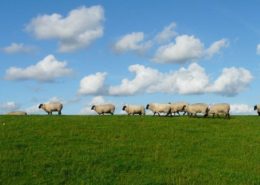The key to generating sustainable environmental systems is all about managing environments. Forage management can be done on farms or in natural landscapes to benefit livestock and other animals. This course is ideal for farm hands or managers, produce or land agents, or anyone involved in the agricultural industry.
The Certificate of Forage Management is a professional development course that will teach you how to establish forage plant pastures, and provide year-round grazing and foraging by managing irrigation, soil, weeds, pests and diseases.
In this forage management course, you will learn about forage resources, grasslands and ecosystems, and fodder trees and shrubs. You will also study forage quality and its use, the various animal-related forage disorders, and how to preserve forage as hay and silage.
On completion of this course, you will have a solid understanding of how to promote natural ecosystems with foraging principles to ensure healthier and more productive agricultural environments.
Course Structure
Unit - Forage Management
Unit 1 – Scope and Nature of Forage Resources
- Introduction
- Terminology
- Types of Forage
- Types of Forage Lands
- What different Animals Eat – Avian, Monogastric, Ruminants, Pseudo Ruminant
- Managing Forage Ecosystems
- Over grazing
- Continuous vs Rotational Grazing
- Ecosystem Health
- Weed Types
- Weed Populations
Unit 2 – Grassland Species and Ecosystems
- Different Ways to Feed Animals
- Different Fodder Systems
- Different Fodder Plants – grasses, legumes, roots, wildflowers, forbs
Unit 3 – Fodder Trees and Shrubs
- Definitions
- Advantages & Disadvantages of Fodder Trees
- Using Fodder Trees
- Harvesting Foliage – pollarding, coppicing, browse blocks, leaf fall, silvopasture systems
- Criteria for plant selection
- Financial considerations
- Considering Tree Species – Acacias, Bamboos, Beech, Black locust, Carob, Honey Locust, Pome Fruits and many more
Unit 4 – Forage Establishment
- Natural area Grazing
- Seeding
- Soil – soil biome, rhizosphere, autotoxicity
- Weed Management
- Biodiversity -riparian zone, birds
Unit 5 – Forage Management
- Regenerative Grazing Management
- Improving Soil Quality
- Strategies for Soil Improvement – crop rotation, tillage, zero tillage, fertility testing, soil compaction, soil cover
- Fertiliser Management
- NPK
- Using Legumes
- Irrigation Management
- Animal Management
- Animal Access Management – hedges, wire, barbed wire, electric fence, stone walls, banks/rises, gates, digital fencing tech
- Controlled Burning
- Pest and Disease Management
Unit 6 – Forage Quality and Use
- Understanding Quality -palatability. intake, digestibility. nutrients, anti quality forage, animal performance
- Composition and Analysis- moisture content, crude protein, fibre, energy, minerals, relative feed value etc
- Cutting
Unit 7 – Forage (Animal) Related Disorders
- Recognising ill health
- Seasonal and Conditional Disorders -bloat, acidosis, nitrate poisoning, prussic acid, grass tetany, phytoestrogens, etc
- Overgrazing
- Parasites
- Worms
- Species Related Disorders – fescue taxicosis, endophyte toxins, ryegrass staggers, antiquality components, phenolic compounds
- Seasonal and Conditional Disorders -plant poisoning
- Disorders Associated with Stored Forages
Unit 8 – Preserving Forage as Hay and Silage
- Making Hay – curing, weather factors, etc
- Mowing
- Conditioning
- Swathe Manipulation to Speed Drying
- Hay Storage and Preservation
- Phases in Silage Fermentation
- Silage Storage
- Silage Management
Study Hours
Estimated duration 50 hours
Course Delivery and Start
Start anytime, self-paced and 100% online
Assessment
Assessment will be comprised of written exercises, including short-answer questions, reflective tasks, short reports and/or projects. There are no examinations or due dates for assessment. As a result, you can complete training in your own time and at your own pace with the assistance of unlimited tutor support.
Testimonials
The content is easy to understand and allows further research of relatable content
R. Jansen, QLD | Certificate of Forage Management
Graduation
A Certificate of Attainment and Statement of Results will be issued upon successful completion of this course.
How to Enrol
Enrol Online: Click Enrol Now (Credit Card) or Enrol Now (Internet Banking/BPAY)
Enrol via Live Chat (Business Hours)
Enrol via Telephone 1300 76 2221 (Business Hours)
Enrol via Purchase Order/Tax Invoice
Enrolling Multiple Staff?
To enrol multiple staff, please complete the Employer Enrolment Form. We’ll be in touch within 60 minutes during business hours!
Payment Options
Visa, Mastercard, BPAY and Direct Deposit.
Course FAQs
Why Choose Australian Online Courses?
- Professional development that is widely recognised and respected;
- Improve your employment opportunities;
- Study online, anywhere via our elearning system;
- High-quality professional development programs written by industry experts;
- All course materials provided online – no textbooks to buy;
- Unlimited tutor support via email;
- We offer twelve (12) months’ access, with extensions available upon application (fees apply);
- Course may be tax deductible; see your tax advisor.
Are there any entry requirements or pre-requisites?
To study online with Australian Online Courses you will need a computer (desktop PC/laptop) running a current/updated operating system with reliable high-speed internet access. You will need to use the Google Chrome browser to access your course.
Are there any computer requirements?
To study online with Australian Online Courses you will need a computer (desktop PC/laptop) running a current/updated operating system with reliable high-speed internet access. You will need to use the Google Chrome browser to access your course.
When can I start this course?
You can start within 60 minutes during business hours when you enrol and pay in full with a credit card!
Credit card: Within 60 mins during business hours.
BPAY: Within 1-2 working days.
Internet Banking: Within 1-2 working days.
Cheque/Money Order: Upon receipt of mailed cheque.
How is this course delivered?
This course is delivered online via our easy-to-navigate Learning Management System (LMS), where you will discover interactive online learning/written content, resources and assessment.
Do I need to attend classes or undertake any work placements?
No. All courses are delivered online via our LMS and there are no work placement requirements in this course.
What support can I expect from Australian Online Courses?
Unlimited tutor support is available throughout your studies via email only during business hours Monday to Friday. Our Administrative team are available Monday to Friday via email, live chat and telephone.
I am an international student. Can I enrol into this course?
Yes! We accept enrolments from individuals both within Australia and internationally; location is no barrier to entry into our programs.
Career Pathways
Future growth
Strong
Unemployment
Low
Professional Development for:
- Farm Managers
- Farm hands
- Produce or Land Agents










